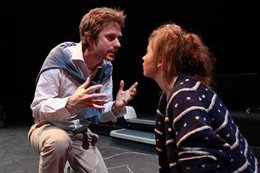The Granary Theatre has played its part in Cork in bringing the wonderfully warped world of Martin Crimp to the stage over recent years. And the artistic director of the Granary, Tony McLeane-Fay gives us a thoroughgoing engagement with a tough-minded piece of writing in his staging of what is described as a triptych of plays under the banner, Fewer Emergencies.
 Even before we enter the auditorium the title tantalises with its sly challenge. And throughout this fascinating piece there is an intellectual tease and theatrical wickedness. Lesser writers pare down their words to bare bones and fall into the predictable pitfalls of sounding both portentous and pretentious. Or worse, the work comes across as a poor relation of Pinter or Beckett, self-regarding minimalism and faux-doom that just sounds naff. But Crimp is very much his own voice and it is not over-reliant on menace to make its presence felt. He brings the audience on a tightrope of nerves, fear, cruelty and tricky inner voices all the time toying with us and making us question how we process our problems and the problems of our contemporary world.
Even before we enter the auditorium the title tantalises with its sly challenge. And throughout this fascinating piece there is an intellectual tease and theatrical wickedness. Lesser writers pare down their words to bare bones and fall into the predictable pitfalls of sounding both portentous and pretentious. Or worse, the work comes across as a poor relation of Pinter or Beckett, self-regarding minimalism and faux-doom that just sounds naff. But Crimp is very much his own voice and it is not over-reliant on menace to make its presence felt. He brings the audience on a tightrope of nerves, fear, cruelty and tricky inner voices all the time toying with us and making us question how we process our problems and the problems of our contemporary world.
The actors in this piece clearly enjoy the way in which they are forced to extend themselves to play the oddly shaped parts. Naturalism is eschewed as the actors take on a series of distracted and disjointed parts. In the first piece, Whole Blue Sky, George Hanover comes across as jolly, practical, argumentative and deluded in a single breath. She plays a woman eleven years into a relationship that started creakily and limps on. She insists that the child has cemented their bond. But she holds the child-doll upside patting the infant’s feet as she tries to persuade us that everything is alright.
The use of microphones is for once on stage an extremely effective tool as Frank Prendergast and Donal McDonald stand in the corners of the spookily lit Granary space, quietly challenging Hanover’s glib insistence that it’s all good. Clodagh Mooney Duggan dressed in a Disney type winged costume looks and sounds like a sweet cherub shooting poisoned arrows throughout this and the other two plays within the piece.
McDonald becomes a Dunblane-type schoolchild killer in the second piece, Face to the Wall. The achievement of this performance is to startle us with its spiky playfulness. There is so much going on under McLeane-Fay's direction of the frenetic action that we are never allowed to react in the way that we might to news coverage or first hand testimonies of such events.  It is not always clear what is going on, not least when McDonald picks up guitar and starts with some blues riffs on the stuff of the plays – but it is always pretty exhilarating.
It is not always clear what is going on, not least when McDonald picks up guitar and starts with some blues riffs on the stuff of the plays – but it is always pretty exhilarating.
The third piece, Fewer Emergencies, sees Prendergast put flesh on an unstable mind teetering on the brink of breakdown as the other character mock him in this male/female warzone. Throughout the 60 minutes the language and stage images buzz like little electric shocks. No, we don’t always know what is happening - but the piece is so commanding of attention that it is hard to find fault with a piece that doesn’t outstay its welcome.
The design of the piece overall is achieved principally through lighting and dimly lit lines of dolls on the walls that necklace the space. With a relatively complex series of sounds it is praiseworthy that the sound quality in Dead School's design is so well achieved. Monika McCleane’s costuming choices are interesting, not least Hanover’s polka-dotted party dress which is in harmony with her brassily cheery disposition but in counterpoint to what is going on for her and around her.
There is a nastiness at play here and to the credit of the production it manages to stay in control of some out of control stuff in a play that disturbingly broadens the idea of fun in the theatre. Never glib, there is an intellectual rigour to the play.
The pity of the timing is that with so much is going on in the Midsummer Fest, this non-festival production might be overlooked. Unless it was late in being scheduled, there seems no good reason why it should not have been incorporated into the festival and enjoyed some of the strong promotional activity that comes with that. If the production is re-visited for another run or toured in the future it is well worth seeing.
Liam Heylin